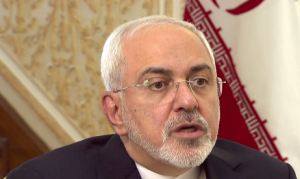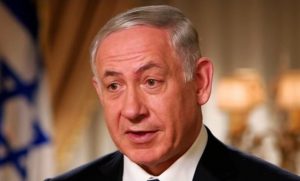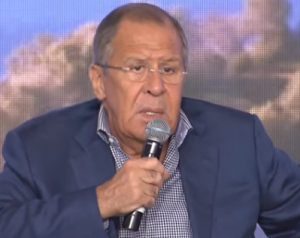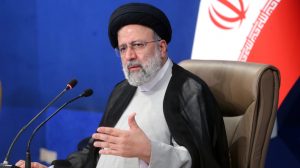
The Guardian, UK: Benjamin Netanyahu has said that Israel will act directly against Iran if necessary, not just its allies in the Middle East.
As Iran’s military role expands in Syria and Yemen and Donald Trump pushes for a more confrontational approach toward Tehran, Israel is seeking wider support for efforts to contain its regional arch-enemy.
Holding a battered and charred fragment of what he claimed was an Iranian drone brought down in Israeli airspace this month, the Israeli prime minister told the Munich security conference on Sunday: “Israel will not allow the regime to put a noose of terror around our neck.
“We will act if necessary, not just against Iran’s proxies but against Iran itself,” he said.
In his first address to the annual Munich event, which draws security and defence officials and diplomats from across Europe and the U.S., Netanyahu warned his audience of a need to immediately counter Iran. He displayed a map showing what he said was Iran’s growing presence in the Middle East.
Iran’s foreign minister, Mohammad Javad Zarif, who also addressed the conference, called Netanyahu’s presentation “a cartoonish circus which does not even deserve a response”.
Zarif accused Washington of using the conference to revive hysteria against Iran, and denied that Tehran was seeking hegemony in the Middle East.
Netanyahu said that while a US-led coalition against Islamic State in Iraq and Syria was regaining territory from militants, Iran was stepping in.
“The unfortunate thing is that as Isis compresses and Iran moves in, it is trying to establish this continuous empire surrounding the Middle East from the south in Yemen but also trying to create a land bridge from Iran to Iraq, Syria, Lebanon and Gaza,” Netanyahu claimed. “This is a very dangerous development for our region.”
Among Israel’s main concerns is Lebanon, where Hezbollah – the heavily armed Shia movement backed by Iran – is part of a coalition government. Israel last fought a war against Hezbollah in 2006, while tensions between Israel and Lebanon have increased recently, including over a maritime border dispute.
Lebanon’s defence minister, Yacoub Riad Sarraf, who spoke after Netanyahu, said: “Watch out, we will defend ourselves … we also have friends.”
Fears of a new war in the region surged on 10 February when anti-aircraft fire downed an Israeli warplane returning from a bombing raid on what Israel said was the Iranian facility that launched the drone into its airspace.
Netanyahu also repeated his view, shared by Trump, that world powers needed to scrap or rewrite the 2015 accord with Tehran that curbs Iran’s nuclear weapons ambitions in return for economic sanctions relief.
He told the conference the deal was similar to the infamous 1938 Munich agreement that western powers signed with Adolf Hitler in an attempt to stave off war in Europe, and which became synonymous with appeasement.
“It’s time to stop them now,” Netanyahu said. “They’re aggressive, they are developing ballistic missiles, they’re not inspecting, they have a free highway to massive [uranium] enrichment.”
France, Britain, Germany, Russia and China, which signed the nuclear deal along with Iran and the US, say the accord cannot be renegotiated, that it is working and that Iran is allowing inspections.
The Russian senator Aleksey Pushkov said scrapping the agreement was akin to choosing between war and peace. John Kerry, the former US secretary of state who helped clinch the deal, said it was “absolutely critical” to ensure it survived.
“We know what the world looks like without the Iran nuclear agreement,” he told the conference. “It’s not a better place.”
If the US abandons the current nuclear deal it is unlikely Iran would consider a new one, Kerry said, adding that it was wrong to assume that Iran would obtain a nuclear weapon as soon as the 15-year scope of the deal ended.
Kerry dismissed Netanyahu’s assertion that Iran would be on its way to having a nuclear arsenal in 10 years. “That’s fundamentally not accurate,” he said.
Netanyahu projected a business-as-usual approach on his visit to Germany despite uproar at home after police said last week that there was enough evidence to indict him for bribery, fraud and breach of trust in two cases.
The Israeli leader has angrily rejected the accusations and denounced what he describes as an overzealous police investigation.
Zarif suggested Netanyahu might be escalating tensions with Iran simply to distract from his “domestic crisis”.





